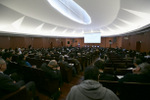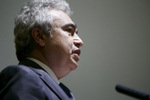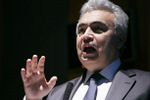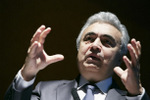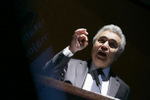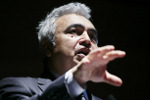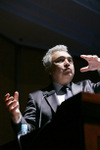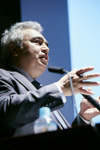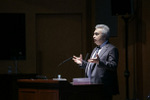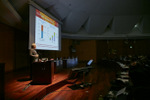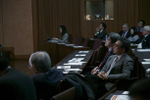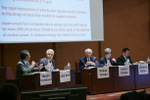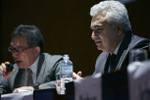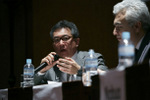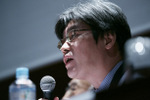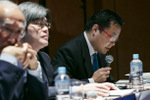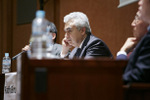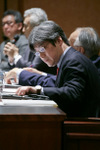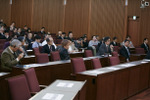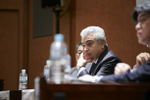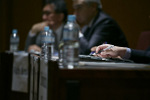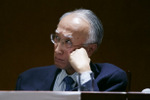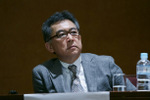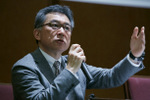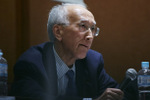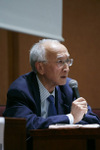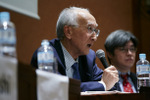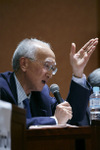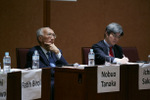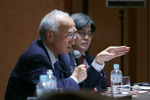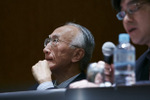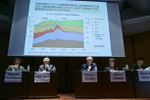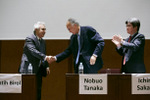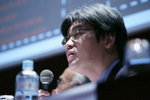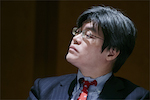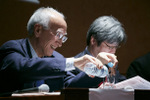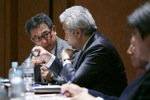Policy Alternatives Research Institute (PARI) / Global Leader Program for Social Design and Management (GSDM) Symposium
GSDM 47th Platform Seminar
The 80th Public Policy Seminar
Global Energy Trends
Report
March 5, 2014
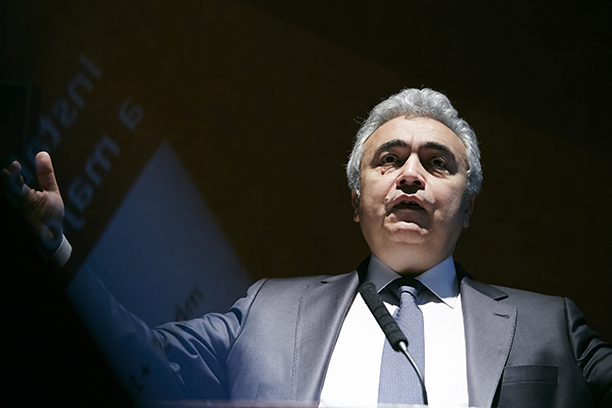
photos by yamashita kayo
| [Date] | Tuesday, February 17, 14:20- |
|---|---|
| [Venue] | Ito Hall, Ito International Research Center, Hongo Campus of the University of Tokyo |
| [Language] | English/Japanese simultaneous translation |
| [Hosted by] | Policy Alternatives Research Institute (PARI) / Global Leader Program for Social Design and Management (GSDM), the University of Tokyo |
| [Co-hosted by] | Graduate School of Public Policy (GraSPP), the University of Tokyo |
| [Supported by] | Economic Research Institute for ASEAN and East Asia (ERIA) |
Event Information (for registration)
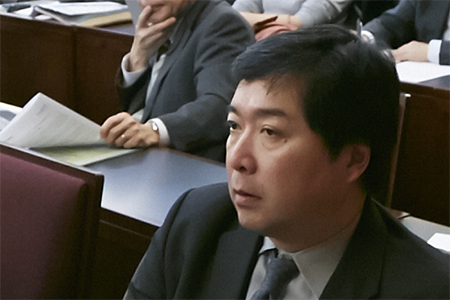
Prof. Hideaki Shiroyama Dean, Graduate School of Public Policy (GraSPP) / Professor, Graduate Schools for Law and Politics, the University of Tokyo |
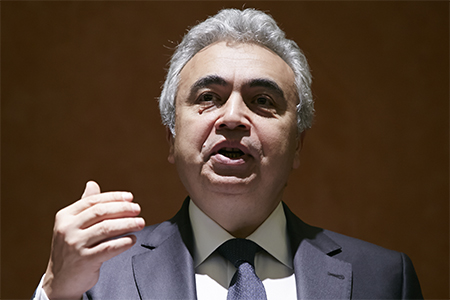
Dr. Fatih Birol Chief Economist, International Energy Agency (IEA) Presentation slides |
 Moderator Prof. Hisashi Yoshikawa Project Professor, Policy Alternatives Research Institute (PARI) / Graduate School of Public Policy (GraSPP), the University of Tokyo |
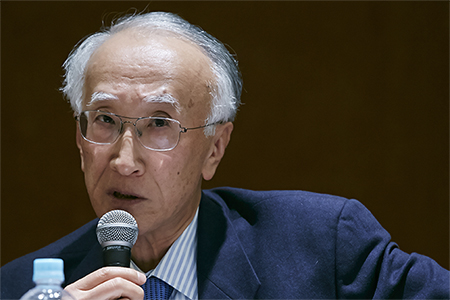 Prof. Nobuo Tanaka Former Executive Director, International Energy Agency (IEA) Professor, Graduate School of Public Policy (GraSPP), the University of Tokyo Presentation slides (Japanese) |
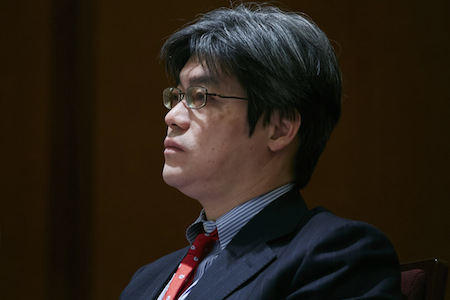 Prof. Ichiro Sakata Prof. Ichiro SakataDirector, Policy Alternatives Research Institute (PARI) / Professor, Graduate School of Engineering, the University of Tokyo Presentation slides |
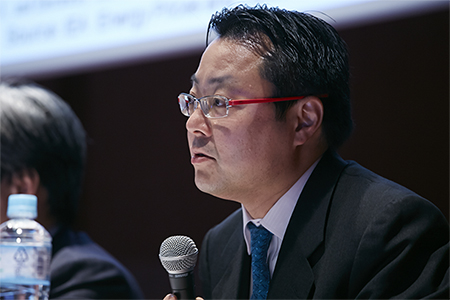 Director, International Affairs Division, Agency for Natural Resources and Energy, Ministry of Economy, Trade and Industry (METI) Presentation slides |
| Q&A Session |
| Closing Remarks |
Report
On February 17, 2015, after the opening remarks by Prof. Hideaki Shiroyama, Dr. Fatih Birol, the Chief Economist and the next Executive Director of the International Energy Agency (IEA), delivered a keynote speech, followed by panel discussions and question-and-answer sessions.
- Global Energy Trends
Energy security and climate change are regarded as global topics in the current trends in the energy scenario. Inadequate investment and security, political, economic, and social instability in the Middle East are considered key problems. Despite increases in oil production in other regions, the Middle East continues to produce most of the world’s oil. Meanwhile, concerted efforts must be made to mitigate climate change; existing estimates indicate that current energy use rates could increase the world’s world temperature by 3.6 C. Experts warn that a temperature rise of more than 2 C could significantly impact human lifestyles. Since the energy sector is responsible for nearly two thirds of the carbon dioxide emitted, departments of energy are expected to propose possible solutions. - Regional Estimations of Energy Demands
According to the World Energy Outlook 2014, energy demands in OECD countries are expected to change only slightly by 2040, while those in emerging economies are projected to increase. These growing energy demands in countries such as India and Indonesia must receive continuing consideration. In contrast, China’s energy demands are expected to decrease, due to the promotion of energy efficiency policies, changes in the Chinese population demographics, and the economic shift away from heavy industry. - Oil
The world demand for oil is scheduled to grow by 14 million barrels per day in the next 20 years. To meet this growing demand, production must increase in the Middle East, as well as in the United States, Canada, and Brazil. Meeting these needs would also require a resolution to the current investment insufficiencies that are the result of the unstable political situations in regions such as the Middle East. Thus, oil securitization strategies need to be continuously assessed.
We are currently experiencing historically low crude oil prices, largely because the amount of oil produced outside OPEC countries is high, marking the highest production rate in 30 years. Yet, overall oil demand has become more modest due to stifled economic growth in China and economic deceleration in Japan and the European Union. However, oil prices are expected to recover by the end of 2015, although the declining trend in oil production will prompt the layoff of engineering labor and shrink investment planning. At the same time, the demand for diesel is anticipated to grow owing to its relatively low price. Above all, the drop in oil investments—a decrease of 17 percent has already been recorded—is of significant concern. - Natural Gas
Given the recent worldwide development of liquefied natural gas (LNG) projects, natural gas supplies are expected to double. In the main, countries that do not export oil are reported to have begun exporting LNG. Natural gas production is desirable from the perspective of energy security, as is constructing markets via conversations with countries importing and exporting the resource. - Electricity
Power plants have deteriorated in OECD countries; nearly 40 percent of the current plants must be replaced in the next 20 years, especially given the future share of electricity among renewable energies and natural gas. - Nuclear Energy
According to the World Energy Outlook 2014, regional nuclear electrical capacity will vastly decrease in the European Union and Japan by 2040; however, it is expected to increase by 17 GW in the United States, by 20 GW in Russia, by 35 GW in India, and by 130 GW in China. Given that China might generate the majority of the world’s nuclear power in the future, it could lead the world nuclear industry, thereby securing technological advantages over OECD countries. This suggests that nuclear energy needs to be discussed in a broader context that includes energy security. As for nuclear policy, controversial issues such as decommissioning and spent nuclear fuel are expected to be resolved by the federal governments. - COP21
As previously mentioned, experts warn that maintaining current lifestyles will be difficult if the world average temperature rises more than 2 C. Carbon emission limits that are necessary to prevent such a scenario show that half of the world’s allowable limit was spent during 19002012, while the other half will be spent during 20122040. Investment in reduced carbon energy technology is therefore inevitable. Current investment in this field is roughly half a trillion dollars, meaning that investment in such technology needs to quadruple. At COP21, which will be held in Paris in December 2015, an international agreement must be reached showing the anticipated rewards of contributions. - Proposal Concerning Japan
Given the current situation, a more diverse, safe, and sustainable energy mix is expected to be implemented in Japan. This decision and its realization would influence both Japan and the rest of the world.
It is important to accommodate economic factors when developing renewable energy policies. For nuclear energy, a comparative assessment of the new policy scenario (NPS) and low nuclear case (LNC) shows that adopting the NPS will increase nuclear energy use by 21% and realize a more balanced mix of energies. In contrast, the LNC would increase carbon dioxide emissions, prompt elevated electricity prices, increase the trade deficit, and make energy security more vulnerable. Though the Japanese government is responsible for the decision-making, the IEA warns that the LNC policy poses several drawbacks and that nuclear energy is needed to strengthen the energy security.
After the Keynote Speech, a panel discussion was moderated by Prof. Yoshikawa, during which Prof. Nobuo Tanaka, former IEA Executive Director, stated that although Japan’s electrical system faces a difficult situation given the accident in Fukushima, resuming nuclear power plant use and extending renewable energy strategies can improve sustainable multi-energy policies. Prof. Ichiro Sakata, Director of Policy Alternatives Research Institute (PARI) of the University of Tokyo, proposed that the University contribute to such ends by establishing a system to integrate knowledge and cultivate human resources, specifically by developing sufficient technology and public policy at the institute. Mr. Shinichi Kihara, Director for International Affairs, Agency for Natural Resources and Energy of METI, then introduced a discussion concerning the development of practicable energy policies to balance all aspects of energy based on S+3E.
Photo Gallery
(Click to enlarge)
Photos by yamashita kayo yamashitakayo.com




